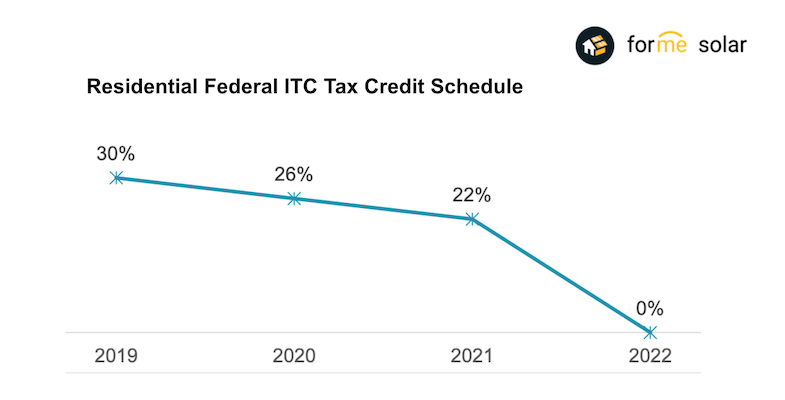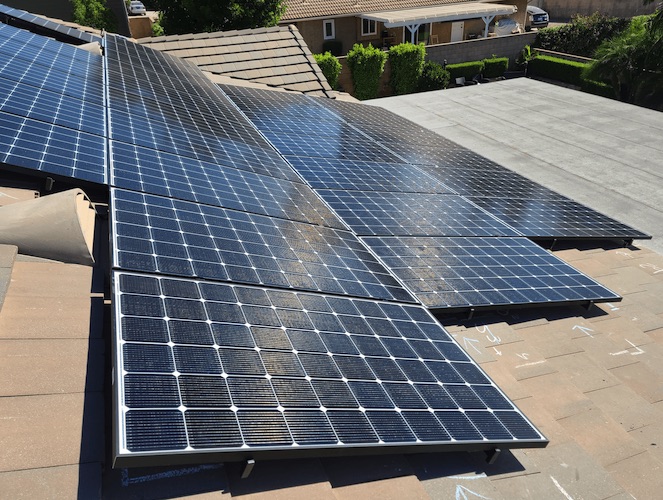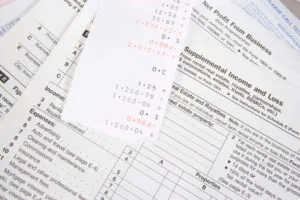The Federal Solar Investment Credit in 2020

Table of Contents
The Federal Solar Tax Investment Credit
The 2020 Solar Tax Credit is a 26% Federal Tax Credit for solar PV systems installed before December 31, 2020. It will decrease to 22% for systems installed in 2021. And the tax credit expires starting in 2022 for residential solar unless Congress renews it. There is no maximum amount that can be claimed.
How to Calculate the Federal Solar Credit 2020
The total amount of the tax credit is easy to calculate. You can calculate the tax credit amount by taking thirty (26) percent of the solar energy system's total cost. If you install your system in 2020, a solar energy system that costs $20,000 would have a tax credit of $5,200. That can be calculated by $20,000 x 26%= $5,200.
If you install solar in 2021, the solar tax credit will decrease to 22%. So for the same system that costs $20,000 your tax credit in 2021 would be $20,000 x 22% = $4,400.
Solar Tax Credit History and Background
The Federal Solar Tax credit was established as a part of the Energy Policy Act of 2005 in an effort to expand the US renewable energy market.
The Energy Policy Act of 2005 created an ITC (Investment Tax Credit), perhaps more commonly known as the federal solar tax credit. This Federal tax credit is equal to a percentage of the total qualified costs of installing a solar energy system. The Energy Policy Act tax incentive was extended numerous times. Then in 2015, the Omnibus Appropriates Act (PL 114-113) included a multi-year extension with a step-down tax credit.
This step-down extension means that the tax credit will drop over time. It dropped to 26%, starting in 2020, and will continue to fall till 2022. You can claim the solar tax credit when you file your Federal taxes. Even if you don't have enough Federal tax liability to claim the full amount in a single year, you have up to three years to claim the tax liability's total amount.

How to Get the 2020 Federal Tax Credit
With the Renewable Energy credit, you subtract your credit amount from the total tax liability the IRS says that you must pay. There is no limit on the maximum amount that can be claimed,
The Federal Tax Credit is different than a tax deduction in that it reduces the amount of income you pay taxes on. A $1,000 credit is worth $1,000 regardless of your tax rate,
If you can't use all of the Federal Tax Credit in one year, you can carry it over later. If your federal taxes are $5,000 for 2020 and you're eligible for an $8,000 tax credit for installing a solar energy system for your home. You can claim the remaining $3,000 tax credit towards your 2021 taxes. However, not every type of solar installation or expenses is eligible for the solar tax credit. Only qualified solar energy systems that meet the IRS guidelines are covered.
What Qualifies for the Solar Tax Credit
The entire bill for a qualified solar energy system, minus the sales tax, qualifies for the solar tax credit. That includes the solar panels, labor costs for on-site preparation, assembly, permits, installation, racking, and piping to connect and activate your solar energy system for your home.
- Installation of a solar system in your primary home residence
- Solar energy systems that are purchased with cash or with a solar loan.
- Solar roofing tiles like the Tesla solar roofs
- Home solar + battery storage system or add-on solar battery storage system
You have Federal income tax liability at least equal to the value of the tax credit across the next three (3) years.
What Doesn't Qualify for the Solar Tax Credit
- Solar installed in an income property in which you don't maintain the residence.
- A leased or PPA solar energy system. In that case, the company that leases it to you gets the credit. This credit is passed along to you in the form of a discounted rate.
Considerations for the Solar Tax Credit

2019 was the last year for the 30% solar investment tax credit (ITC) for projects that improve energy efficiency and lower the carbon footprint of residential and commercial buildings. In 2020, the tax credit gets reduced to 26%. And this credit gets smaller with each passing year, eventually fading away for homeowners in 2022.
You have to keep in mind that the federal solar tax credit is nonrefundable. And is only possible for the system owner. Therefore, homeowners with a solar energy system through a Solar Lease or Power Purchase Agreement are not eligible for the Solar ITC.
We recommend that you contact and consult your personal tax advisor for eligibility and any questions about your tax situation.
Are you looking to install solar for your home?
With the expiring solar tax credit, don't wait too long to get a quote on solar. Always seek a professionals help when considering solar for your home since they will have the best knowledge on how to handle your home energy situation in an efficient manner. If you are in need of home solar in California? Call Forme Solar at (714) 694-2262 and request a solar quote today!













